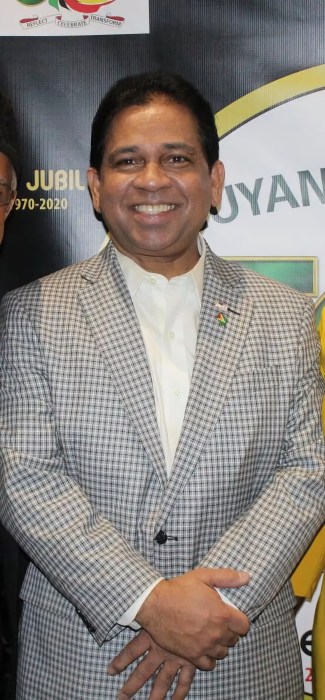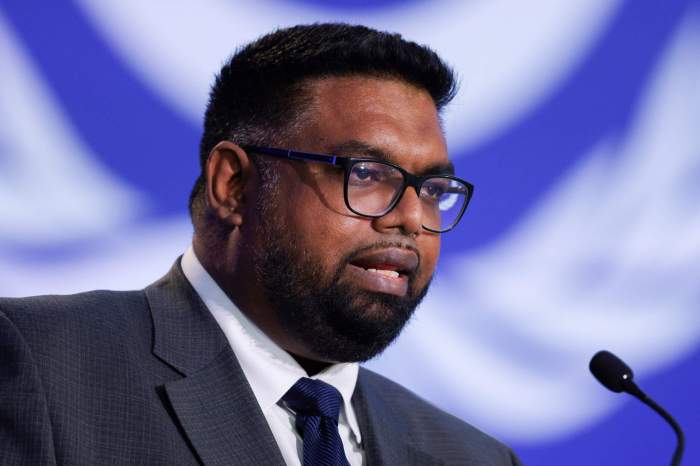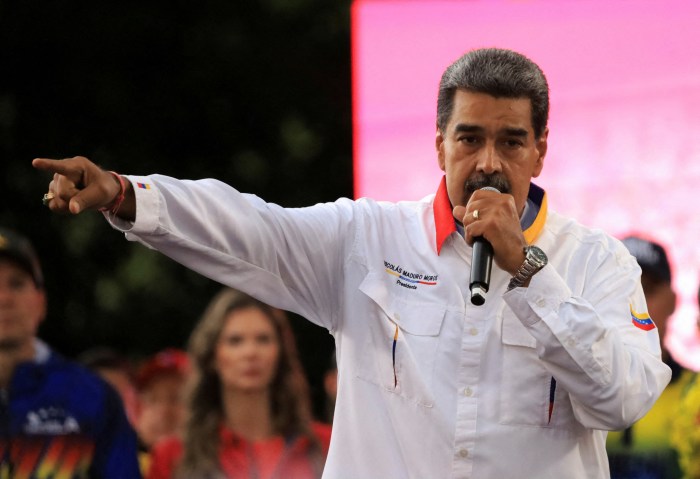CARACAS, Venezuela (AP) — Opposition politician Leopoldo Lopez bowed out of Venezuela’s presidential race on Tuesday, saying he will support his leading rival as the opposition seeks to field a single candidate to challenge President Hugo Chavez.
The announcement gives a significant boost to Henrique Capriles, the youthful 39-year-old state governor who has a commanding lead in the polls ahead of the Feb. 12 opposition primary. It also shakes up the field of five remaining contenders in the primary, which will choose a unity candidate to face Chavez in the Oct. 7 election.
“You will be the next president,” Lopez said at a news conference with Capriles. The two embraced and raised their arms before a cheering crowd
“In me, he will have a great ally,” said Lopez, who is on a list of hundreds of politicians barred from holding office in the past decade due to corruption investigations. He calls the probe politically motivated.
Recent polls show Chavez’s popularity slightly above 50 percent, down from the 63 percent support he received in 2006 elections, emboldening Venezuela’s opposition, which in the past has been splintered and disorganized in its challenges to the socialist president.
Pollster Luis Vicente Leon said the opposition is seeing its “best moment” politically. Capriles’ support has been above 40 percent among likely opposition voters in recent polls, and will likely pick up a significant share of Lopez’s support, Leon said.
Lopez, a former mayor of Caracas’ Chacao district, had been trailing among opposition contenders in recent polls, with one recent survey giving him 16 percent support. Lopez said that with his departure, “unity is strengthened” within the opposition.
The athletic Capriles has captured support among Venezuelans by presenting himself as a capable manager and pledging to solve problems such as rampant crime, unemployment and 27-percent inflation.
Capriles has tended to avoid direct verbal confrontations with Chavez and has described his politics as center-left. He likens his approach to that of former Brazilian President Luiz Inacio Lula da Silva, who promoted pro-business policies while funding social programs that made him popular among the poor.
Capriles is currently the governor of Miranda state, which is the country’s second-most populous state and includes parts of Caracas as well as largely impoverished towns in the surrounding hills. He served as mayor of Caracas’ Baruta district before he was elected governor in 2008, defeating a close ally of Chavez. He is also a former congressman.
“We need all your good ideas here,” Capriles told Lopez during the news conference. “We both have the same dream.”
“You have to look for a wife for me,” Capriles, who is a bachelor, joked to the married Lopez.
Capriles said that from now on Lopez will coordinate his campaign, but he denied that their alliance had anything to do with doling out potential future positions.
According to recent polls, Capriles’ top rival in the race is Pablo Perez, the governor of western Zulia state, who has been trailing in the surveys.
Perez shrugged off the alliance between his rivals, but also said he thinks voters dislike such political deals. “Votes can’t be endorsed. In politics, two plus two isn’t four,” Perez told reporters, expressing confidence.
A December survey by the Caracas-based pollster Datanalisis found that 33.6 percent supported Perez, while 44.9 percent favored Capriles.
Capriles said he aims for a “break with the old way of conducting politics,” and that remark seemed to irritate some within the group of parties that back Perez.
“One thing is breaking with the bad of the past, and it’s something else to generalize,” said Omar Barboza, a leader of Perez’s party. “I think it’s immaturity,” Barboza said, apparently referring to Capriles’ remark.
Others running in the Feb. 12 primary include congresswoman Maria Corina Machado, Diego Arria, a former Venezuelan ambassador to the United Nations, and Pablo Medina, a leftist former union leader.
Chavez has been in office for 13 years and is seeking another six-year term in the October election. He has sought to portray his opponents as allies of the wealthy and the U.S. government.
“The candidate of the counterrevolution, whoever it is… is going to be the candidate of the Yankees,” Chavez said in a speech Tuesday night, without referring to any of his potential challengers by name. “He’s going to be the candidate of the bourgeoisie.”
Lopez had gone ahead with his presidential bid despite a Supreme Court ruling in October that had upheld a ban on him holding office.
In its decision, the Supreme Court upheld a decision by the country’s top anti-corruption official disqualifying Lopez from holding office until 2014, yet also said he could be a candidate. The Supreme Court dismissed as “unfeasible” a decision by the Costa Rica-based Inter-American Court of Human Rights that had sided with Lopez and said his political rights had been violated.
“Lopez was running far behind in the polls, and the Supreme Court’s defiance of the decision by the Inter-American Court left a big cloud of uncertainty over Lopez’s future, even if he were to come out ahead,” said Cynthia Arnson, director of the Latin America program at the Woodrow Wilson International Center for Scholars in Washington. “Capriles has been the front-runner for some time, so the endorsement will continue to bolster his campaign.”
Capriles called his relationship with Lopez “an alliance with a view fixed on Oct. 7.”






















